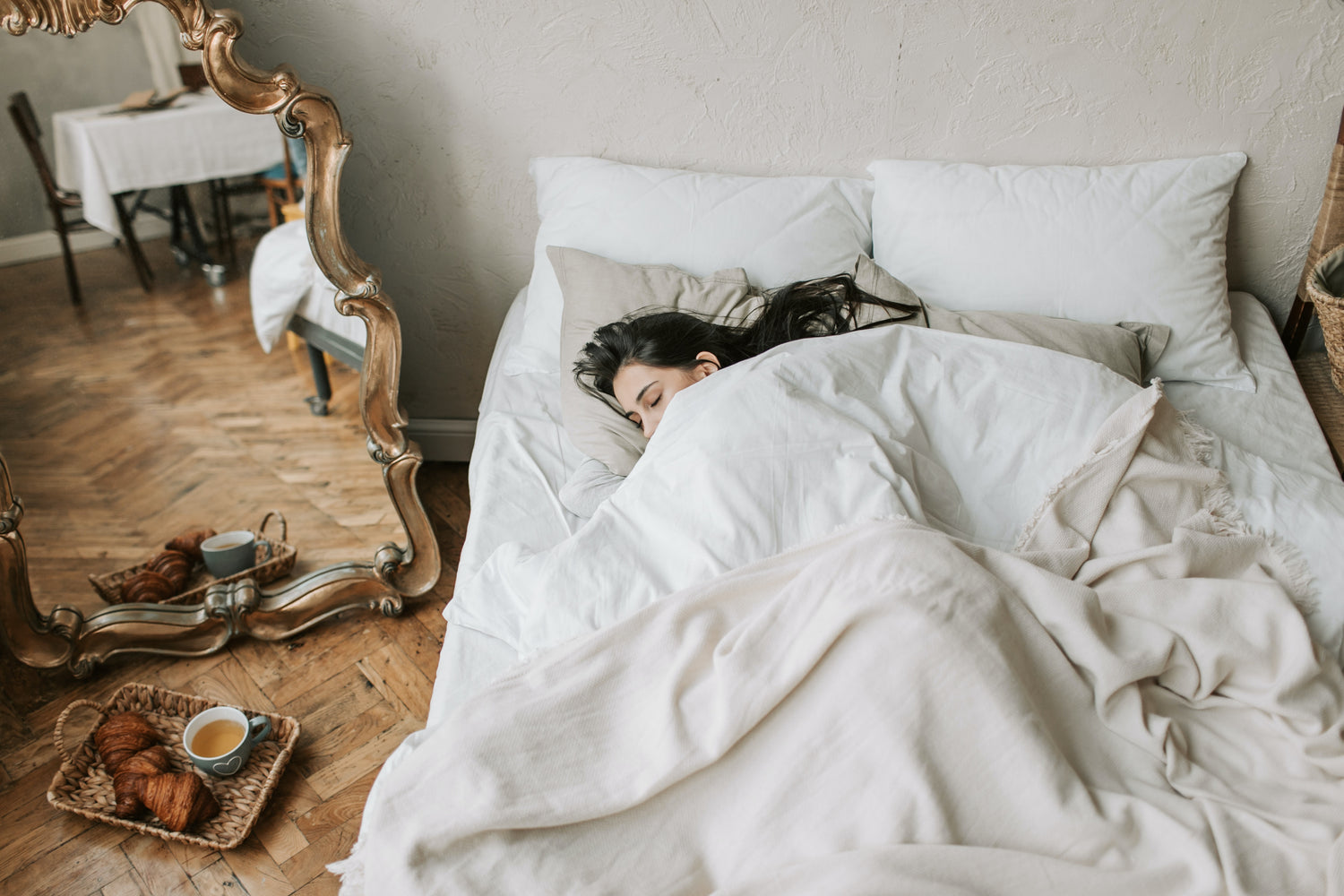You stopped consuming caffeine after 1 p.m. and bought blue light filters.
Nevertheless, restful sleep still seems to be not working so well.
Not only do your hormones affect your mood and metabolic function, they also play a big role in the amount of sleep you get each night.
Maintaining balanced hormones is essential for getting the sleep your body needs every night, but that's much easier said than done. So what can you do?
First, let's take a look at how hormones affect your sleep!
Hormones that influence sleep
The human body secretes and circulates about 50 different hormones, most of which are produced by the endocrine system. The endocrine system includes a series of glands that produce and secrete your hormones. And just as there are many different types of hormones, there are also different glands that secrete them. Each gland produces a different hormone, and likewise, each hormone contributes to a different function.
How does this relate to sleep? Certain hormones, such as cortisol and melatonin, affect your body in specific ways that impact your ability to sleep. Whether it's stress, anxiety, anger, or sexual stimulation, there are a variety of reasons why your hormones could be preventing you from falling asleep.
Here are the five main hormones related to sleep:
Estrogen - Estrogen is largely associated with women's reproductive health and plays a key role in the menstrual cycle and your body's ability to utilize serotonin, an important feel-good neurotransmitter. Levels of this hormone fluctuate widely throughout your life, and low levels can cause a variety of sleep-related symptoms.
Progesterone - Better known as the female sex hormone, progesterone is one of the hormones most closely linked to sleep quality. At higher concentrations, progesterone has an anti-anxiety effect, allowing you to fall asleep faster. However, at lower concentrations, mood swings and cramps are two common symptoms.
Testosterone - Testosterone levels don't fluctuate in the same sporadic way as estrogen or progesterone. Instead, testosterone levels often decline gradually over a longer period of time, meaning much lower concentrations are present in older people. These lower levels are often associated with poorer sleep quality and can even lead to insomnia.
Insulin - This hormone controls your blood sugar levels. Sleep deprivation can raise blood sugar levels and encourage unhealthy nighttime eating habits. This, in turn, triggers insulin release, causing blood sugar levels to fluctuate throughout the night. When blood sugar levels are higher, you're more likely to have a much more restless night's sleep than usual.
Cortisol - Known as the stress hormone, it is a steroid produced in the adrenal glands. It is responsible for controlling blood sugar levels, regulating metabolism, reducing inflammation, and improving memory. However, too high levels of cortisol can lead to high blood pressure, mood swings, anxiety, depression, rapid weight gain, and, you guessed it, disturbed sleep.
Melatonin - Melatonin's main function is to regulate the sleep cycle. Exposure to light stimulates a neural pathway in the part of the brain that controls hormone production, called the suprachiasmatic nucleus (SCN). When exposed to light, the SCN begins to release stimulating hormones like cortisol and suppressing hormones like melatonin. Conversely, when it gets dark, the SCN signals to produce more melatonin and suppress cortisol. Too much stress during the day can increase cortisol levels, while watching Netflix or scrolling through Instagram and other social media platforms before bed can suppress melatonin.
How can you control your hormones?
Now that you have a better understanding of the hormones that affect your sleep, it's time to use this information and get a good night's rest.
Here are some things you can do to balance your hormones for better sleep:
Reduce screen time before bed - Watching TV or scrolling through your phone before bed can suppress your melatonin levels, which can significantly impair your ability to fall asleep. Instead, try reading a book or listening to calming music.
Relax - It may sound pretty obvious, but doing things to relax before bed can make a huge difference in your sleep quality. Whether it's meditation, yoga, bathing, exercising, scented candles, lavender oils, or knitting—whatever makes you feel comfortable and relaxed, make the most of it, and you'll fall asleep in no time.
Establish a routine - The human body thrives on a consistent routine that follows its circadian rhythm. Try to go to sleep and wake up at the same time every day. While it may be tempting to sleep in, oversleeping will make you feel much worse in the long run and could cause just as many problems as not getting enough sleep.
Be mindful of when you eat - Eating before bed is a bad idea, as it increases both your insulin and cortisol levels. If you eat before bed and still manage to fall asleep, deep REM sleep will be harder to achieve, and the quality and duration of your sleep will suffer.
Rely on the right supplements - Natural levels of the hormone melatonin typically rise about two hours before bedtime, preparing your body for a restful night's sleep. Our SWEET SLEEP contains melatonin, valerian, and passionflower extract. It supports you with its calming effects and also strengthens your deep sleep phases, so you wake up refreshed the next morning and ready for the day.
Understanding the hormones that affect your sleep is the first step to connecting with your body and making the necessary changes to get quality sleep. Take the time to learn your body's natural rhythms and develop a sleep routine that supports balanced sleep cycles. Once you do, you'll be able to sleep soundly!




Leave a comment
This site is protected by hCaptcha and the hCaptcha Privacy Policy and Terms of Service apply.